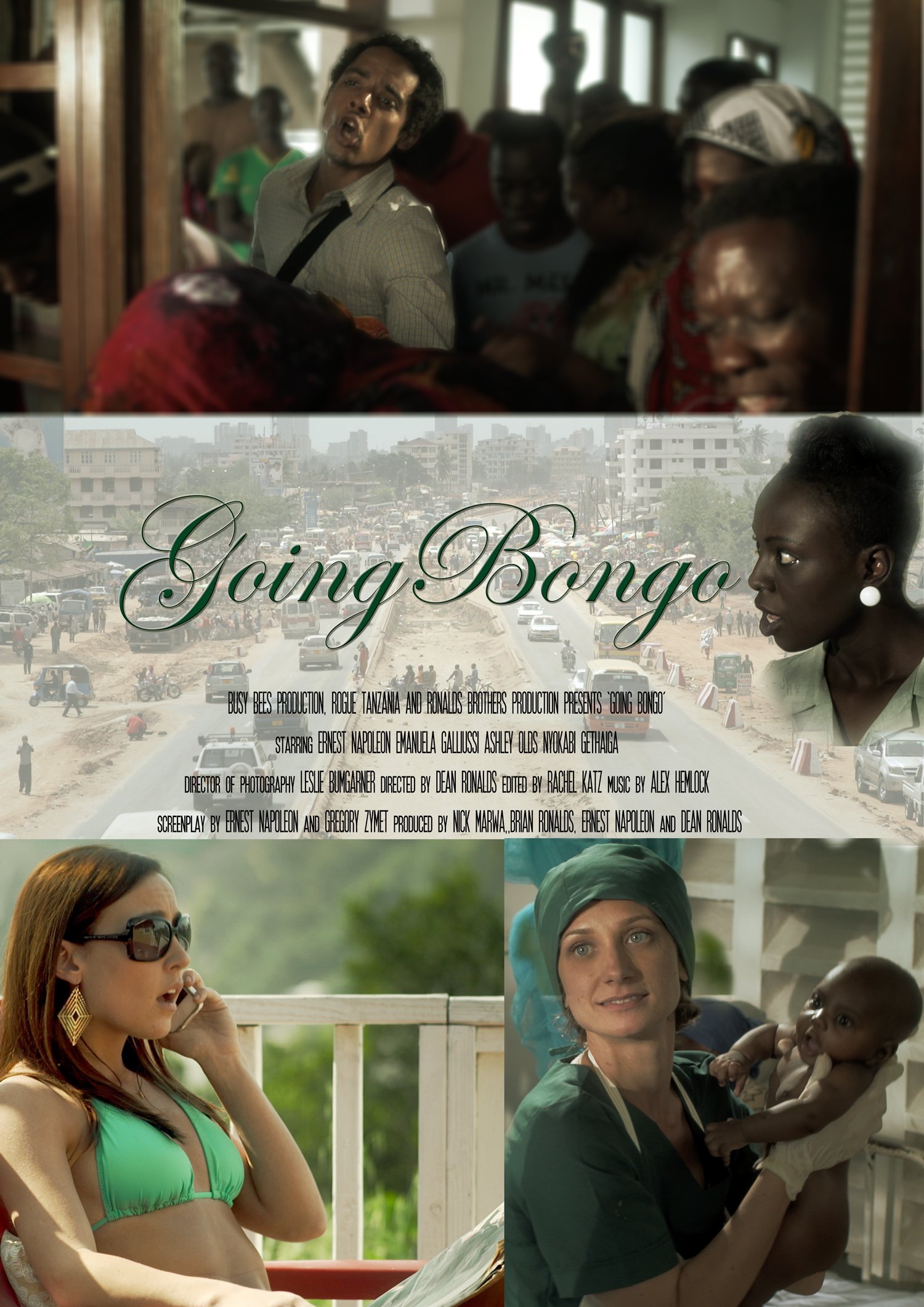 Bongo Movies have emerged as a cultural phenomenon within Tanzania and the broader East African region. These Tanzanian films, produced in the local Swahili language, have gained immense popularity among both local and international audiences. Offering a unique blend of entertainment and cultural representation, Bongo Movies have become a cherished form of artistic expression and storytelling. In this article, we will delve into the world of Bongo Movies, exploring their significance, impact, and the reasons behind their widespread appeal.
Bongo Movies have emerged as a cultural phenomenon within Tanzania and the broader East African region. These Tanzanian films, produced in the local Swahili language, have gained immense popularity among both local and international audiences. Offering a unique blend of entertainment and cultural representation, Bongo Movies have become a cherished form of artistic expression and storytelling. In this article, we will delve into the world of Bongo Movies, exploring their significance, impact, and the reasons behind their widespread appeal.
Originating in the early 1990s, Bongo Movies have flourished against the backdrop of Tanzania’s rich cultural heritage and diverse linguistic landscape. With Swahili being one of the most widely spoken languages in East Africa, these films have been instrumental in promoting linguistic unity and cultural exchange across the region. By producing movies in Swahili, Bongo filmmakers have not only provided a platform for local talent but have also enabled viewers from different countries to connect and understand each other’s cultures.
One of the key reasons behind the popularity of Bongo Movies lies in their relatable and realistic storytelling. Unlike their Hollywood counterparts, Bongo films often depict everyday life experiences, showcasing the struggles, dreams, and aspirations of ordinary Tanzanians. From family dynamics to societal challenges, these movies tackle a range of issues that resonate with audiences on a personal level. Through their narratives, Bongo Movies not only entertain but also shed light on social issues, ultimately fostering dialogue and encouraging positive change within Tanzanian society.
Furthermore, Bongo Movies have played a significant role in promoting local talent and boosting the Tanzanian film industry. With a growing number of talented actors, directors, and producers, these films have opened doors for creative individuals to showcase their skills and contribute to the cinematic landscape. The success of Bongo Movies has also led to increased investment in the industry, resulting in improved production quality and wider distribution networks. This, in turn, has facilitated the export of Tanzanian culture and stories to international audiences, promoting the country as a vibrant hub of creativity.
Additionally, Bongo Movies have become an important source of entertainment for Tanzanians, who eagerly await new releases and passionately discuss their favorite films. From urban centers to rural villages, these movies have managed to captivate audiences from all walks of life. The cultural significance of Bongo Movies is evident in the rise of film festivals dedicated to showcasing Tanzanian cinema, as well as the growing number of cinemas and video halls across the country. This cultural phenomenon not only provides an escape from daily routines but also instills a sense of pride and identity among Tanzanian viewers.
In conclusion, Bongo Movies have become an integral part of Tanzanian culture and have made a significant impact within the East African region. Through relatable storytelling, the promotion of local talent, and the celebration of Swahili language and culture, these films have managed to capture the hearts and minds of audiences far and wide. Bongo Movies have not only entertained but also educated, shedding light on social issues and fostering cultural exchange. As this unique cinematic industry continues to evolve, it will undoubtedly leave an indelible mark on Tanzanian and East African society, ensuring that Bongo Movies remain a vibrant and cherished form of artistic expression for years to come.
Evolution of Bongo Movies: Trace the development and growth of Bongo Movies from their inception to the present day. Discuss the early influences, key milestones, and notable contributors who have shaped the industry.
Bongo Movies, also known as Swahiliwood, have come a long way since their humble beginnings. In this article, we will take a closer look at the evolution and growth of Bongo Movies, exploring their early influences, key milestones, and the notable contributors who have shaped the industry into what it is today.
The birth of Bongo Movies can be traced back to the early 1990s when Tanzanian filmmakers began experimenting with producing movies in Swahili, the most widely spoken language in East Africa. These movies aimed to cater to the local audience by portraying stories that resonated with their cultural values and traditions. The emergence of Bongo Movies marked a significant departure from the dominance of foreign films and offered Tanzanian filmmakers a platform to showcase their talent on a national scale.
One of the key milestones in the evolution of Bongo Movies was the release of the film “Dar 2 Lagos” in 2008. Directed by Ayoubu Rajab, this film gained international recognition and brought Bongo Movies to the forefront of the African film industry. “Dar 2 Lagos” showcased the potential of Bongo Movies to tell compelling stories with high production value, paving the way for future success.
Over the years, several notable contributors have played a crucial role in shaping the Bongo Movies industry. One such individual is Steven Kanumba, a talented actor who starred in numerous Bongo Movies and became an icon within the industry. Kanumba’s exceptional acting skills and dedication to his craft inspired aspiring actors and filmmakers, leaving a lasting impact on Bongo Movies.
Another significant contributor to the evolution of Bongo Movies is Elizabeth ‘Lulu’ Michael, a prominent actress known for her versatility and captivating performances. Lulu’s talent and dedication to her work have earned her numerous accolades, making her a role model for many aspiring actors and actresses in Tanzania.
The growth of Bongo Movies can also be attributed to the advancements in technology and accessibility of filmmaking equipment. With the rise of digital cameras and editing software, independent filmmakers were able to produce high-quality movies at a fraction of the cost, democratizing the industry and fostering creativity.
Today, Bongo Movies continue to thrive, with a diverse range of genres and stories being explored. The industry has witnessed an influx of fresh talent, with new actors, directors, and producers pushing the boundaries of storytelling. Bongo Movies have not only gained popularity within Tanzania but have also garnered international recognition, with films being showcased at prestigious film festivals around the world.
In conclusion, the evolution of Bongo Movies has been a remarkable journey that has transformed the Tanzanian film industry. From their humble beginnings to the present day, Bongo Movies have grown in popularity, thanks to the dedication and talent of the industry’s notable contributors. With the support of advancing technology and a thriving local audience, Bongo Movies are poised to continue making their mark in the global film industry for years to come.
Explore the common themes and storytelling techniques employed in Bongo Movies. These Tanzanian films have gained immense popularity not only within the country but also across East Africa. Through their engaging narratives, Bongo Movies provide a unique insight into the social, cultural, and economic realities of Tanzanian society. From exploring the complexities of love and family dynamics to tackling prevalent societal issues and crime, these films serve as mirrors reflecting the diverse aspects of Tanzanian life.
One of the most prevalent themes in Bongo Movies is love. These films often delve into the intricacies of romantic relationships, showcasing the joys, challenges, and sacrifices involved. Love stories in Bongo Movies frequently revolve around the concept of true love conquering all obstacles. These narratives not only entertain but also serve as a source of inspiration for audiences, reminding them of the power of love and its ability to prevail even in the face of adversity.
Family dynamics also play a significant role in Bongo Movies. These films shed light on the importance of familial bonds and explore the complexities within family relationships. From the challenges faced by blended families to the conflicts between generations, Bongo Movies capture the nuances of family life in Tanzania. By doing so, they create a relatable experience for viewers, allowing them to reflect upon their own familial connections and the values that shape them.
In addition to love and family, Bongo Movies daringly address societal issues that affect Tanzanian society. These films tackle topics ranging from corruption and poverty to gender inequality and HIV/AIDS. By highlighting these matters, Bongo Movies contribute to raising awareness and initiating conversations around these pressing issues. Furthermore, they often provide a platform for marginalized voices, shedding light on the experiences of those who are often unheard in mainstream media.
Crime is another intriguing theme explored in Bongo Movies. These films delve into the dark underbelly of society, showcasing the consequences of illegal activities and their impact on individuals and communities. By portraying the dangers and repercussions of criminal behavior, Bongo Movies aim to discourage viewers from engaging in unlawful acts while also emphasizing the importance of justice and accountability.
Through their compelling storytelling techniques, Bongo Movies captivate audiences and effectively convey the realities of Tanzanian society. These films often employ a mix of drama, comedy, and suspense to engage viewers and keep them hooked from beginning to end. The use of relatable characters and authentic settings further enhances the immersive experience, allowing audiences to connect with the stories unfolding on screen.
In conclusion, Bongo Movies provide a window into the social, cultural, and economic realities of Tanzanian society. With their exploration of themes such as love, family, crime, and pressing societal issues, these films not only entertain but also educate and initiate important conversations. As the popularity of Bongo Movies continues to grow, they serve as a testament to the power of storytelling and its ability to shed light on the intricacies of life in Tanzania.
Bongo Movies: Revolutionizing the Tanzanian Film Industry
In recent years, the Tanzanian film industry has witnessed a remarkable transformation, thanks to the emergence of Bongo Movies. These Swahili-language films have not only captivated local audiences but have also gained significant popularity among East African communities and the diaspora. The impact of Bongo Movies on the Tanzanian film industry and its reach beyond national borders is undeniable, as it continues to revolutionize the perception of African cinema.
One of the most striking aspects of Bongo Movies is their ability to resonate with Tanzanian audiences. These films portray relatable stories that reflect the realities of everyday life in Tanzania. From tales of love and family dynamics to social issues and cultural traditions, Bongo Movies offer a unique and authentic representation of Tanzanian society. This has endeared them to local viewers who see their own experiences mirrored on the silver screen.
But the impact of Bongo Movies extends far beyond Tanzania’s borders, captivating audiences across East Africa and the diaspora. The films have garnered a strong following in neighboring countries like Kenya, Uganda, and Rwanda. This cross-border popularity is a testament to the compelling storytelling and universal themes presented in Bongo Movies. They transcend language barriers and cultural differences, allowing viewers from diverse backgrounds to connect with the narratives on screen.
Furthermore, Bongo Movies have become a significant cultural export for Tanzania. The diaspora, consisting of Tanzanian nationals living abroad, has embraced these films as a means of reconnecting with their homeland. Bongo Movies provide a sense of nostalgia and a glimpse into the Tanzanian way of life for those who are separated from their roots. This cultural connection allows the diaspora to maintain a sense of identity and pride in their Tanzanian heritage.
The success of Bongo Movies can also be attributed to the advancements in technology and the accessibility of the internet. With the rise of online streaming platforms, these films have found a global audience. Tanzanian filmmakers are now able to showcase their work to the world, reaching audiences that were previously inaccessible. This newfound visibility has not only expanded the reach of Bongo Movies but has also opened doors for collaborations and co-productions with international partners.
In conclusion, Bongo Movies have had a profound impact on the Tanzanian film industry and have reached far beyond national borders. These films have gained popularity not only among Tanzanian audiences but also among East African communities and the diaspora. By portraying relatable stories and reflecting the realities of Tanzanian society, Bongo Movies have captivated viewers and provided a unique cultural connection. The emergence of these films in the global arena has also transformed the perception of African cinema, showcasing the talent and creativity of Tanzanian filmmakers to the world.
The Bongo Movie industry, like many others, faces its fair share of challenges. Limited funding, piracy, and competition from international films are some of the obstacles that have hindered its growth and development. However, amidst these challenges, there are also potential strategies and opportunities for the industry to thrive and expand in the future. One such avenue is the role of digital platforms, which have emerged as a powerful tool for distribution and promotion. Additionally, international collaborations can also open doors for the Bongo Movie industry to reach new audiences and gain global recognition.
Limited funding has been a longstanding issue for the Bongo Movie industry. Without adequate financial support, filmmakers struggle to produce high-quality films that can compete with international productions. This has led to a lack of infrastructure and resources, making it difficult for the industry to flourish. However, with the rise of digital platforms, there is an opportunity to overcome this hurdle. Online crowdfunding campaigns have proven successful in other industries, and the Bongo Movie industry can tap into this model to secure funding for their projects. By reaching out to supporters both locally and internationally, filmmakers can gather the necessary resources to create compelling and captivating films.
Piracy is another major challenge faced by the Bongo Movie industry. Illegal distribution and sharing of movies not only result in financial losses but also discourage investors from financing new projects. To combat piracy, the industry needs to focus on enhancing copyright protection and enforcement. Collaborating with government agencies and law enforcement can help create stricter regulations and penalties for those involved in piracy. Additionally, educating the public on the negative impacts of piracy and promoting legal means of accessing movies can also help reduce this menace.
The competition from international films is yet another obstacle for the Bongo Movie industry. Hollywood blockbusters dominate the global market, making it difficult for local films to gain recognition and attract audiences. However, instead of viewing this as a threat, the industry can embrace it as an opportunity. By collaborating with international filmmakers and production companies, Bongo Movies can tap into the global audience. Joint ventures and co-productions can help bridge cultural gaps and showcase the unique stories and talent from the Bongo Movie industry to a wider audience. Furthermore, film festivals and international showcases can serve as platforms for exposure and networking.
Digital platforms play a crucial role in the future outlook of the Bongo Movie industry. With the increasing popularity of streaming services and online content consumption, filmmakers can bypass traditional distribution channels and reach audiences directly. By making their films available on platforms like Netflix, Amazon Prime, or YouTube, Bongo Movies can gain international exposure and generate revenue through streaming. Embracing digital technology also opens up opportunities for innovative storytelling techniques and interactive experiences, further enhancing the industry’s growth potential.
In conclusion, while the Bongo Movie industry faces challenges such as limited funding, piracy, and competition from international films, there are strategies and opportunities for growth and expansion. Leveraging digital platforms and embracing international collaborations can enable the industry to overcome these obstacles. By securing funding through online crowdfunding, combating piracy through stricter regulations and public education, and collaborating with international partners, the Bongo Movie industry can thrive in the ever-evolving world of cinema. Furthermore, digital platforms provide a pathway for global exposure and revenue generation, ensuring a promising future for the industry and its talented filmmakers.



